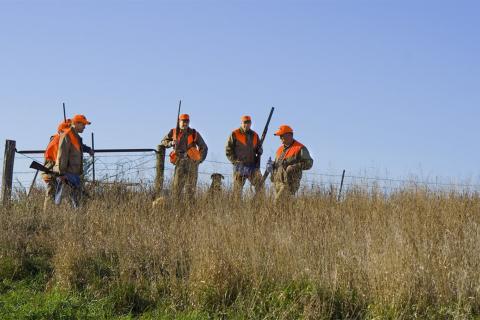
If you enjoy upland bird hunts and having a great time with friends or family outdoors, then eventually you'll want to travel to one of the premiere states in the nation to hunt pheasants and quail. While everyone dreams of South Dakota for pheasants, and rightly so, you'll also find great opportunities in several nearby states. Whichever state you choose, it helps to undertake the task with some pre-trip planning and organizing to ensure you have a safe and successful hunt.
Tip: Suggested Hunting Gear Checklist for you, your dog and the group
Self-Guided or Guided Hunt?
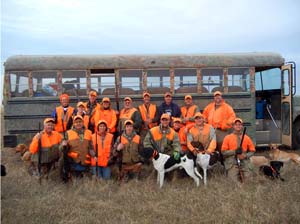
hunted with friends from South Dakota at
Pheasant City Lodge in Wessington, S.D.
Once you've chosen to travel, you'll have several options to choose from — your main priority is deciding whether you'll do a self-guided public land hunt, a guided hunt on private land, or a mix. Public land hunts will be a bargain for the budget conscious, but be aware you'll be competing with other hunters for space and will most certainly be hunting pressured and wary wild birds.
Guided hunts options are plentiful; you can choose from moderately-priced semi or fully-guided hunts to all-inclusive five-star lodges; and from released birds to wild birds, or a mix of both. Be sure to ask exactly what is included for the "All Inclusive" hunts so you'll know exactly what you get for the price you pay.
If you're undecided, consider doing a bit of both and spending some time understanding how the hunts can differ in difficulty and quality. Keep in mind the groups skill level and consider what will make the hunt most rewarding for the group. Now is also time to decide on your group size, keeping in mind what you find most satisfying about a group hunt. It's up to you to keep it small or invite a bunch!
Key topics to discuss are budget, time constraints, type of hunt preferred, and trip goals.
Research Months Before Pheasant Season
Months before pheasant hunting season, do your homework and research where you wish to travel to and the specific area you plan on hunting. If going out of state, state and local wildlife agencies and tourism boards have a wealth of information available for free, and you'll find a plethora of information quickly and easily on the internet. One great state resource to use is from the National Shooting Sports Foundation at www.nssf.org.
Begin your research by compiling a list of your favorite hunt locations and accommodation options, then gather together with your group and decide where you'd like to go.
The next step is making inquiries to reserve your lodging and guiding for the hunt dates you've chosen. You'll book your lodge accommodations and guided hunts at the same time, but be sure you do NOT book a "Hunt Only" package until you're sure you have available lodging in the nearby area to also book. Make your deposit promptly to hold your spot, and be sure to first ask about facilities and rules for dogs, if you plan on bringing your own.
For Group Hunting Trips: Research These Areas Too
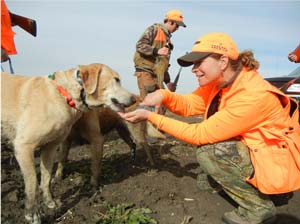
and be sure to pack plenty of water to keep the group, and the dogs, hydrated throughout the
day.
- Geographic area you wish to hunt
- Public hunting maps and access
- Private land and lodges
- State laws and regulations
- Safety laws and shot requirements
- Lodging accommodations available in the area
- Guiding options
- Meal or restaurant options
- Dog facilities and rules for each lodging choice
Do Your Group Planning for the Hunt
Group members need to commit and plan for the hunt. Everyone should gather to discuss requirements needed for the group, and decide what type of hunt will work best for the size group you'll be traveling with. A discussion about cover and types of terrain is a good idea; you'll find a variety of cover choices from grasses, sorghum, corn, sunflowers, and milo to cattails, marshes, and treelines available to hunt in most areas.
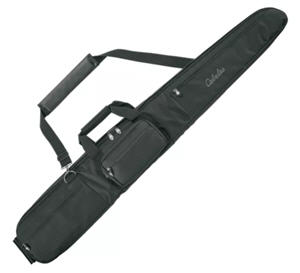
Find out what best suits the group preferences. Group members should all be aware of each others skill level and experience, and offer assistance and advice to newer hunters. For any group, but especially for larger groups, pre-hunt "safety sessions" are a must and help deter from errors in the field. Be sure to ask group members about any special requirements or needs and then before making reservations, make sure the lodge or guide is able to make arrangements for the special needs required.
Suggested Hunting Gear Checklist
Personal Hunting Gear:
- Shotgun or two and gun cases
- Shotgun shells and shell storage box (Be aware of public land shot
requirements; they may differ from private land.)
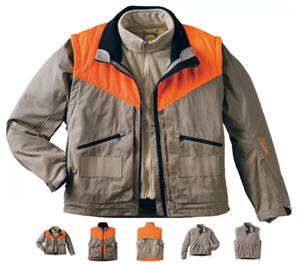
- Blaze orange hats, blaze upland bird vest and/or blaze jacket
- Chaps like Cabela's Upland Traditions or brush pants
- Waterproof and comfortable upland hunting boots and knee-high
rubber boots

Mesh-Back Shooting Gloves
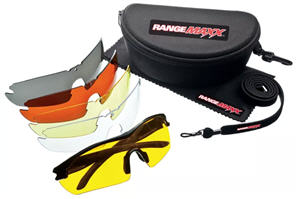
Shooting Glasses
- Several pairs of socks; light, mid-weight and heavyweight
- Shirts, turtlenecks, sweatshirts and a sweater
- Long underwear
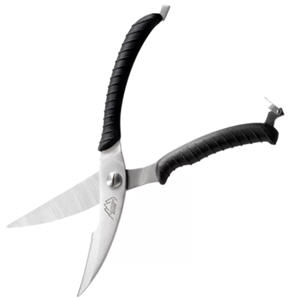
Group Hunting Gear:
Multiple coolers for bringing home birds with each car, be sure to divide up birds correctly following possession limits
Hunting knives, shears and latex gloves for cleaning
- Paper towels
- Plastic baggies
- Garbage bags
- Water, for group members and plenty to keep dogs hydrated
- Snacks for breaks in the field (for members and for the dogs)
Hunting Dog Gear:
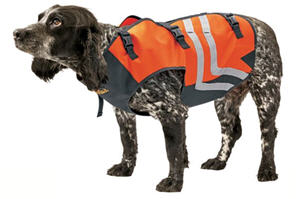
- Dog crate or kennel; be sure to ask at your hotel or lodge if dogs are allowed in the rooms
- Water and food; bring along plenty of water in the field for your dog
- First aid kit for dogs, complete with eye ointment, first aid ointment and tweezers
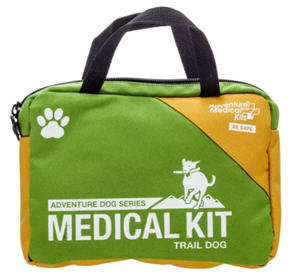
- Dog blaze orange collar or safety dog vest
- Name, phone and directions to nearest Vet office in case of urgent care needs
Group Hunting Travel Tips
Everyone in the group should be notified of the departure time and location. Arrive early and allow everyone time to re-organize and pack trucks as needed. All drivers should be aware of the travel route, and should be sure to have each others cell phone numbers.
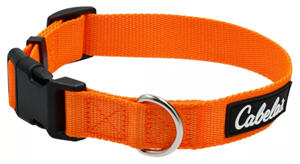
Stay together and stop often to walk and water hunting dogs, usually every few hours.
Plan on "travel-only" days, giving yourself time to arrive, unpack, eat, and be well-rested for the first day of your hunt. Be sure to budget in some time to explore public land or spend a couple of hours with a landowner if you're doing a self-guided or semi-guided hunt. Spend time with the group planning how to best hunt a tract of land, and be sure all members understand how the hunt will be executed.
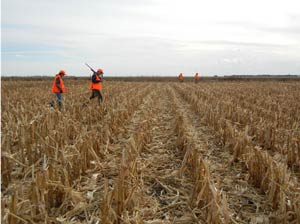 Tip: For all group hunts, be sure to discuss safety issues before heading into the field
Tip: For all group hunts, be sure to discuss safety issues before heading into the field
Talk over safety issues and be sure all hunters understand how the dogs hunt; whether they flush or point and if they're a jumper, etc. The group should also be reminded to keep the dogs safe at all times.
Show Appreciation to Private Landowners for Permission to Hunt
Group members should consider bringing gifts for private landowners granting permission to hunt their lands. Consider acknowledging their generosity and kindness by offering specialty foods from the state or local area you're traveling from, or sharing your own processed wild game foods with them. Invite them to join you in the field, or afterwards at dinner. Better yet, invite them to come to your own state to hunt and offer your help to assist them! A little appreciation goes a long way.
Do your homework and plan well in advance so you'll be able to enjoy your hunt and the time afield with your hunting buddies.
Be safe, be thorough and be respectful and you'll have a memorable and successful bird hunt!
- 17705 views

